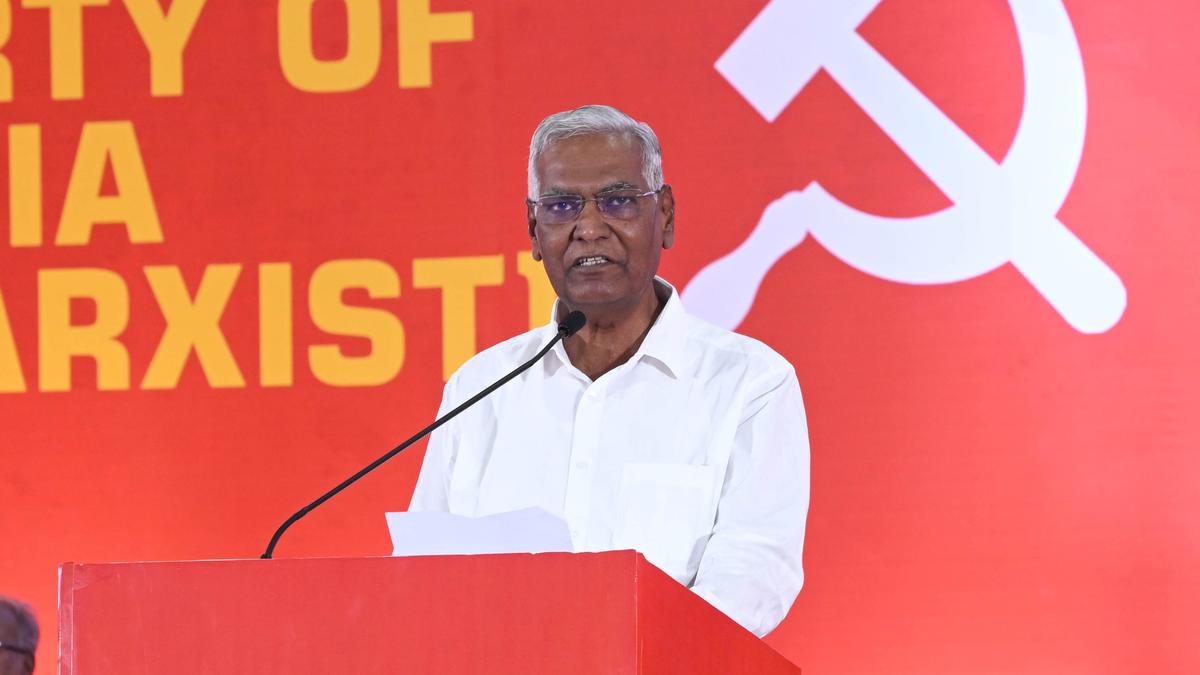The Communist Party of India (CPI) has moved the Supreme Court challenging the constitutional validity of the Waqf (Amendment) Act, 2025.
The Left party has filed a writ petition through its general secretary D Raja, in which it has contended that despite the opposition from the masses, the Waqf (Amendment) Bill was passed by the Centre without proper consideration of the objections raised by the members of the Joint Parliamentary Committee (formed to review the Bill) and the other stakeholders.
The plea filed through advocate Ram Sankar in the top court said the Amendment Act, published on April 5 following the assent of the President, substantially curtails the autonomy of the Waqf Board and fundamentally transforms the framework of the Waqf Act, 1995.
“It vests unchecked authority in the Central government over the administration of the Waqf Board, thereby infringing upon the rights guaranteed under Articles 25,26, and 29 of the Constitution,” the CPI said.
CJI-led Bench to hear petitions on April 16
Earlier, several petitions were filed in the top court challenging the legislation on various grounds.
Recently, actor-politician and TVK president Vijay challenged the legislation.

A Bench headed by the Chief Justice of India (CJI), Sanjiv Khanna, is scheduled to hear on April 16 more than a dozen petitions, including the one filed by AIMIM MP Asaduddin Owaisi challenging the constitutional validity of the Waqf law.
Besides the CJI, Justice Sanjay Kumar and Justice K.V. Viswanathan are part of the three-judge Bench set up for hearing the petitions, according to the apex court website.
In addition to Mr. Owaisi’s plea, the top court has listed for hearing petitions filed by AAP MLA Amanatullah Khan, the Association for the Protection of Civil Rights, Arshad Madani, Samastha Kerala Jamiathul Ulema, Anjum Kadari, Taiyyab Khan Salmani, Mohd Shafi, Mohd Fazlurrahim and RJD leader Manoj Jha.
A few other petitions are yet to be listed before the Bench by the apex court registry.
On April 8, the Centre filed a caveat in the top court seeking a hearing before any order was passed in the matter.
A caveat is filed by a party in high courts and the apex court to ensure that no orders are passed without hearing it.
The Union government on April 8 notified the Waqf (Amendment) Act, which received President Droupadi Murmu’s assent on April 5 after its passage in Parliament following lengthy heated debates in both Houses.
The legislation was passed in the Rajya Sabha with 128 members voting in favour and 95 opposing it. It was cleared by the Lok Sabha with 288 members supporting it, and 232 voting against it.
The All India Muslim Personal Law Board (AIMPLB), Jamiat Ulama-i-Hind, DMK, Congress MPs Imran Pratapgarhi and Mohd Jawed, and the CPI through its leader D Raja are the other key petitioners.
Tamil Nadu’s ruling DMK also moved the top court through its deputy general secretary A Raja and said in a release, “Despite widespread opposition, the Waqf (Amendment) Bill was passed by the Union government without proper consideration of the objections raised by the members of the Joint Parliamentary Committee and the other stakeholders.”
The party said that immediate implementation of the Act infringed upon and prejudiced the rights of about 50 lakh Muslims in Tamil Nadu and 20 crore Muslims in other parts of the country.
Besides political parties, Muslim bodies such as the AIMPLB, Jamiat Ulama-i-Hind and the Samastha Kerala Jamiathul Ulema — a religious organisation of Sunni Muslim scholars and clerics in Kerala — have also filed separate pleas in the top court.

In a press statement, AIMPLB spokesperson S Q R Ilyas said its petition strongly objected the amendments passed by the Parliament for being “arbitrary, discriminatory and based on exclusion”.
The amendments, he said, not only violated the fundamental rights guaranteed under Articles 25 and 26 of the Constitution but also clearly revealed the government’s intention to take complete control over the administration of Waqf, therefore, sidelining the Muslim minority from managing its own religious endowments.
Articles 25 and 26 ensure freedom of conscience, the right to practise, propagate religion, and the right to establish and manage institutions for religious and charitable purposes, he said.
Congress MP Jawed’s plea alleged that the Act imposed “arbitrary restrictions” on Waqf properties and their management, undermining the Muslim community’s religious autonomy.

In his separate plea, AIMIM chief Owaisi said the legislation took away from Waqfs various protection accorded to Waqfs, and Hindu, Jain and Sikh religious and charitable endowments alike.
The Association for the Protection of Civil Rights, an NGO, also challenged the law’s constitutional validity in the top court .
AAP’s Delhi MLA Khan has sought the law be declared unconstitutional, being violative of “Articles 14, 15, 21, 25, 26, 29, 30 and 300-A of the Constitution”.
Published – April 14, 2025 03:30 pm IST
